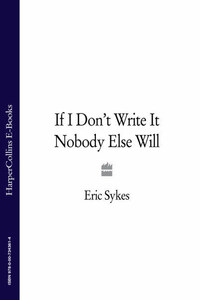On 4 May 1923 I was born, but in giving me life my mother sacrificed her own. Officially recorded as ‘Harriet Sykes, née Stacey, died in childbirth’, cold, clinical and final: cold and clinical yes, but final? We shall see. Although my mother had departed this life, she hadn’t abandoned me. I know this to be true, from instances in my life too numerous to be passed off as mere coincidence, in fact some so inexplicable, so impossible, that they can only be described as miracles. As for my poor father, one can hardly imagine the depth of his despair, the rising panic as his whole world collapsed around him—his beloved Harriet in exchange for this red-faced wrinkled intruder. How was he to manage? He already had a two-year-old son, Vernon, and, good grief, at the time Father was only twenty-three years old, an ex-sergeant in the occupation forces in Germany and now, in this land fit for heroes, a lowly labourer in a cotton mill, which in those early post-war years was no more than being a white slave, the manacles being the need to eat.
Counsellors had yet to be invented, social workers didn’t exist and the Citizens Advice Bureau was not even in the pipeline; but on the plus side, people cared more, and neighbours and anyone else who knew of the tragedy at 36 Leslie Street, Oldham, offered not only their condolences but, more to the point, food, and cast-off clothing; and apparently one old lady offered a kitten. It was heart-warming but it didn’t solve the problem. Before long the cavalry arrived, as my distraught father knew they would, his parents, Granddad and Grandma Sykes, and my late mother’s family, the Staceys, were not far behind.
It must have been a very sombre get-together. What was to be done? Most likely I was asleep at the time, so I can only surmise what happened next. Grandma Stacey was to take Vernon—after all, he was two years old and house-trained—but she refused point blank to take me as well. I discovered many years later that Grandma Stacey had been against the marriage in the first place, and Father was persona non grata in her house. However Mother used to visit regularly with her small son Vernon and ergo he was the only memory of their daughter Harriet had left them, whereas in their eyes I was partly responsible for the loss, and in truth I probably was.
What then should be done with me? My father couldn’t take me with him to the cotton mill every morning and crèches were unheard of in those days. However after a time a solution was found. I was to be deposited with a kind spinster called Miss Redfern who lived in Davies Street, or it may have been Miss Davies of Redfern Street—I didn’t keep a diary in those days. I’m now in my eighties and I still haven’t got round to it.
Of the two years of my displacement I have only vague memories, of my surrogate mother’s house: the smell of furniture polish, and above my cot a huge parrot that squawked incessantly from the time the black cloth was taken off the cage until it was mercifully covered up again at bedtime. It was my constant companion until eventually I was returned to the custody of my father at 36 Leslie Street, much less salubrious, with no smell of furniture polish (we didn’t have enough furniture to warrant the extravagance), but at least it was home. In later years my father told me that neither he nor anyone else could understand what I was babbling about. Hardly surprising, as I’d never learned English, but spoke fluent parrot. At two years old I was incontinent, and still unsteady on my pins, because learning to walk too early was not encouraged in case it led to rickets.
Cataclysmic changes had taken place during my absence at Redfern/Davies’s. My father had married again and already I wasn’t the youngest in the family: I had a little brother, John. He was still only at the sleeping and eating stage of development, but already I’d taken to him. It was the beginning of a close, warm-hearted friendship that was to last a lifetime. Apparently I hovered round his cot most of the day, impatient for him to grow up so that we could play together. When John was twelve months old or there-abouts we’d hold conversations. I would come out with something and when I’d finished he’d wait for a moment or two before the penny dropped that it was his turn to speak, and when he obviously couldn’t he’d gurgle, splutter and blow raspberries, making both of us laugh with sheer joy. It must have been the first time in my life that I laughed—the parrot must have found me a very dull ha’p’orth.
Two or three years later John was growing into a beautiful little boy, and one of the highlights for me was John’s bedtime. Mother cradled him in her arms, then, sitting herself down in the rocking chair, she would begin singing. Softly she sang a hymn, the same one every time, but she didn’t sing the words. It was ‘bee bough, bee bough, bee bough, bee bough’, each word synchronised to each rock, and a gentle patting in the same tempo; she ‘bee boughed’ in an absent-minded voice, staring into space as if I wasn’t there. I don’t think I was jealous, envious, or left out. It never even occurred to me that no one had ever sung me to sleep, embraced me or kissed me; I accepted as a natural progression that in our house I was last in the pecking order, and strangely enough it didn’t bother me at all. Although I was unaware of it at the time, being a non-playing lodger relieved me from all responsibility and I was free to live in the fantasy world in my head, which transcended the hopelessness of the surrounding poverty and deprivation that typified most cotton towns in the late 1920s. Incidentally the hymn that Mother ‘bee boughed’ I discovered years afterwards was ‘O God, our help in ages past’.








